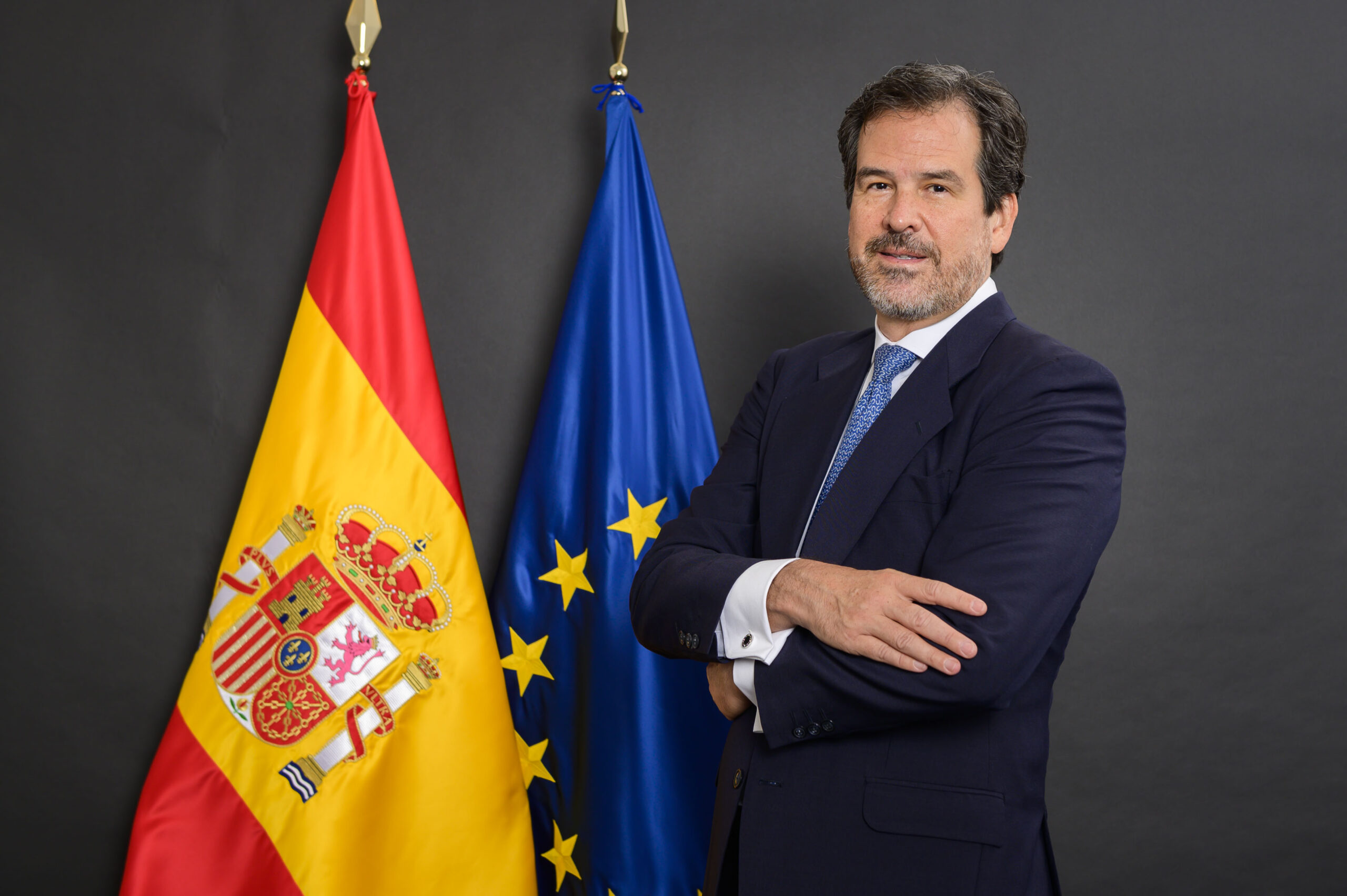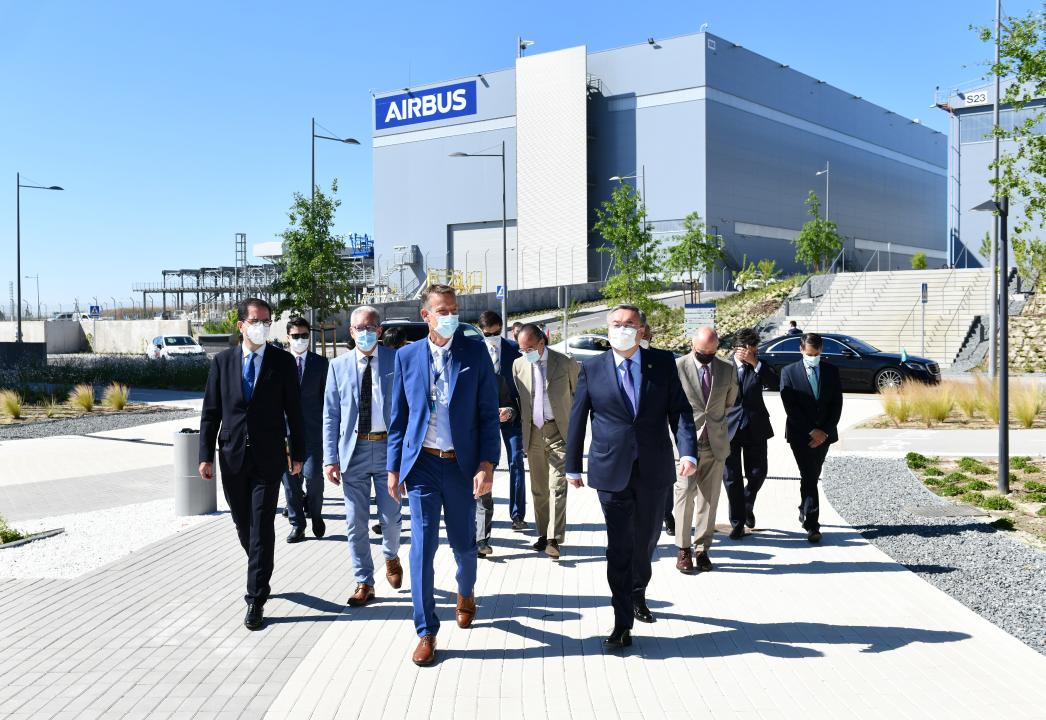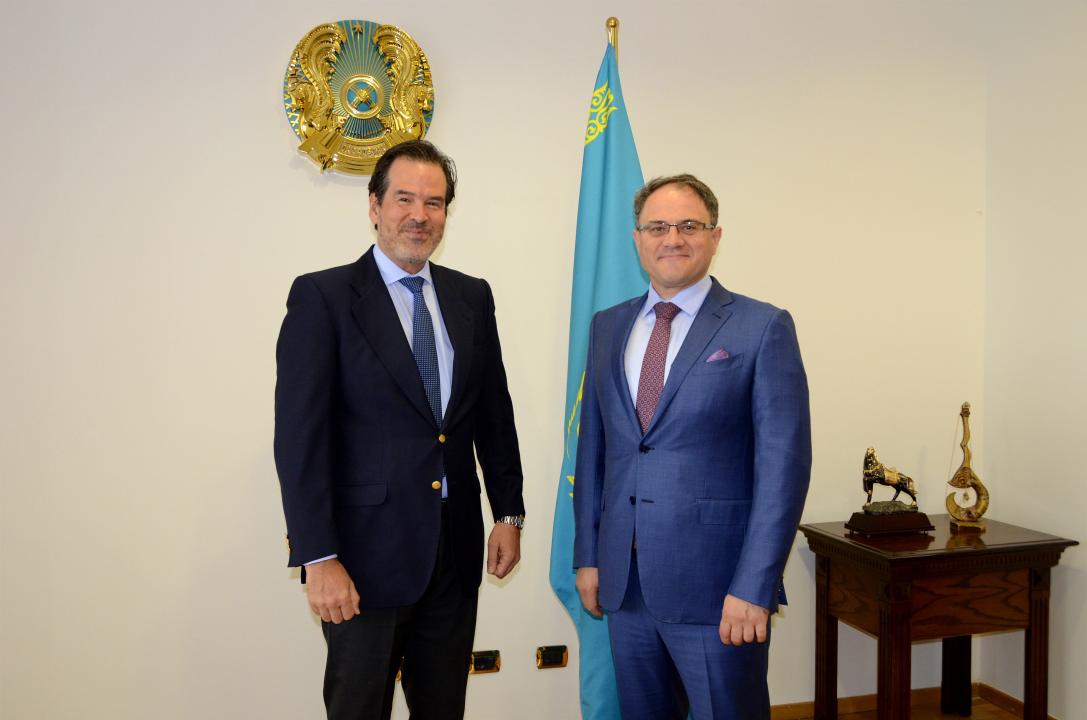ASTANA – Bilateral ties between Kazakhstan and Spain are growing as they crossed a 30-year milestone last year. The ambition that Kazakhstan and Spain demonstrate, the dynamism of Spanish companies, and the reforms undertaken by President Kassym-Jomart Tokayev give high hopes the next 30 years are going to be just as fruitful as the previous ones, said Spanish Ambassador to Kazakhstan Jorge Urbiola in an exclusive interview for this story.

Ambassador Jorge Urbiola. Photo credit: Embassy of Spain in Kazakhstan
Kazakhstan and Spain established diplomatic relations in February 1992, just a few weeks after Kazakhstan gained independence in December 1991. Over these years, there have been multiple high-level visits, besides regular political and economic consultations.
More recently, Kazakh Foreign Minister Mukhtar Tileuberdi traveled to Spain in July 2021 to forge trade and investments. In December, Kazakhstan’s Deputy Foreign Minister Roman Vassilenko and Spain’s Secretary of State for Foreign and Global Affairs Angeles Moreno Bau co-chaired the seventh political consultations in Madrid.
“If we look back and observe the path traveled during 30 years of bilateral relations, it would be difficult to say that the best is yet to come. (…) Focusing on 2023, our short-term goals are the entry into force of the Air Transport Agreement, the arrival of more Spanish companies and a successful Joint Committee and Business Council,” said Urbiola.
The bilateral air transport agreement, pending the final internal procedures on the Kazakh side, will speed up the launch of direct flights between Kazakhstan and Spain.
“I am also confident that airlines will soon open direct flights between Kazakh and Spanish cities, given that Kazakhstan has recently confirmed the open sky policy and there is a growing demand by Kazakh tourists to visit Spain,” said Urbiola.
The ambassador praised how the bilateral ties are developing.
“If I had to summarize our bilateral relation in one word, I would certainly say excellent. We are two countries without historical disputes of any kind, with a Strategic Association in force since 2010, a regular flow of high-level political contacts and a consolidated framework for intergovernmental and business dialogue in the field of economic relations,” said Urbiola.
He quoted the words of Abai Kunanbayev’s “Book of Words” to describe the bilateral ties.
“If you allow me to use a literary metaphor, I would use the image the great Abai used in his ‘Book of Words’ to refer to his life, but the other way around, ‘a long road fraught with struggles and quarrels, disputes and arguments, suffering and anxiety.’ The history of our bilateral relation lies exactly on the opposite side of Abai’s description,” he said.
Trade and investments grow at a “rapid pace”
Spain is one of Kazakhstan’s five largest trading partners among the European Union countries. Between January and October, bilateral trade turnover reached $2.2 billion. The Kazakh economy received $287.6 million in direct investments from Spain from 2005 to the second quarter of 2022.

Tileuberdi visits the Airbus facility in Spain. Photo credit: Kazakh Foreign Ministry.
Sixty-seven legal entities with Spanish capital, including Maxam, Airbus, Indra, IDOM, Eurofinsa, Tecnove Security, and Inditex, are working in Kazakhstan.
Urbiola said Spain and Kazakhstan’s bilateral trade relations are increasing at a “rapid pace.” According to him, 2022 witnessed a 60 percent increase in Spanish exports and an 84 percent increase in Kazakhstan’s exports. Kazakh exports largely include crude oil, ferroalloys, and aluminum products, and imports are medicines, tires, trucks, and passenger cars.
“Though the figures for the month of December 2022 have not yet been made available, the estimate is that Spain’s exports surpassed $200 million. Apart from fashion, which is Spain’s main export to Kazakhstan, a big component is industrial products, such as machinery, tractors, tires, chemicals or pharmaceuticals,” he said.
Speaking about the economic relations, Urbiola described it as “good, imbalanced and growing.”
“They are good, according to the figures. Bilateral trade stood at more than $3 billion in 2022. They are imbalanced because the trade coverage ratios for Spain have been rather low for several years, with a record low of only 5.6 percent in 2018. This is due to the fact that Kazakhstan is one of our main suppliers of crude oil. The good news is that they are growing,” said the Spanish envoy.
According to Urbiola, ongoing political reforms under the Just Kazakhstan agenda will attract investors to the country.
“Kazakhstan recovered growth very fast after the pandemic and continued growing in 2022. Per capita gross domestic product is on the rise, the economy is becoming more efficient and consumption is expanding, all of which make the country attractive to Spanish companies and investors. It is also of utmost importance to apply a clear tax policy to foreign companies, a key element for the right business climate,” he said.
Major projects and promising areas of cooperation
One of the latest projects is between Técnicas Reunidas, a Spanish engineering company, and KazAzot, Kazakhstan’s national manufacturer and exporter of ammonia and ammonium nitrate, to develop the engineering services of a fertilizer plant in Aktau, which, according to Urbiola, will be the biggest in Kazakhstan.

In 2001, Kazakhstan Temir Zholy national railway operator commissioned Talgo to deliver a six-car tilting train for a series of demonstration tests on the 1,350-kilometer line between Almaty and Astana. Photo credit: talgo.com.
Talgo, producing and maintaining fast trains, has been among the major Spanish companies working in Kazakhstan since 2001.
“In the field of fashion, ZARA and other brands from INDITEX group, one of the largest fashion retail groups in the world, already have a big presence in the country. This popular retail hotspot keeps offering the latest trends to Kazakh consumers of all ages and employs more than 1,000 local staff,” said Urbiola.
GLOVO, a popular delivery service in Kazakhstan, also hails from Spain. It operates in 14 cities and employs 100 staff and 7,000 couriers.
“Other Spanish companies are operating solid waste recycling facilities in Kazakh cities, contributing to a cleaner environment that will benefit future generations,” he added.
Opportunities are emerging in the renewables sector. Kazakhstan sets ambitious goals for renewable energy development, aiming to achieve carbon neutrality by 2060. Spain is on a similar path, seeking to become carbon neutral by 2050.
“In the sector of renewable energies, some Spanish companies are negotiating investments in Kazakhstan in hydroelectric power generation, wind turbines, and solar energy. There are also opportunities in desalination. When I first visited the Mangystau region, I realized the experience of Spanish companies in irrigating drylands could perfectly fit the local needs of converting the water from the Caspian Sea into drinking water and irrigation,” he said.
Urbiola also mentioned healthcare, wastewater treatment and the fishing industry as promising areas for the two countries.
The upcoming meetings of the Intergovernmental Joint Economic Committee and the Business Council are expected to forge diversification in two-way commerce and investment.
Kazakhstan-Spain partnership in the context of the European Union
In the second half of 2023, Spain is expected to assume the Presidency of the Council of the European Union for what will be the country’s fifth time in that position. Urbiola said Spain’s presidency would “certainly fit as a glove into a broader Kazakhstan-EU cooperation.”

Ambassador Urbiola and Roman Vassilenko during their meeting in July. Photo credit: Kazakh Foreign Ministry.
“During our recent Annual Conference of Ambassadors, Vice-Minister for Europe informed us that Central Asia will be a foreign policy priority area during the Spanish Presidency. We will continue the work initiated by Presidents of the European Council and European Commission, Michel and von der Leyen, as well as HR/VP Borrell, in the recent meetings held with President Tokayev,” he said.
The work that Urbiola mentioned will concern the Trans-Caspian International Transport Route, also known as the Middle Corridor, which, he noted, encompasses many of the key areas of the EU-Kazakhstan bilateral agenda, including sustainable connectivity.
“It will certainly be a touchstone for the Global Gateway initiative. As regards the EPCA [Enhanced Partnership and Cooperation Agreement signed by Kazakhstan and EU in March 2020], we will work together with the European Commission for the effective implementation of as many spheres as possible,” he added.
Culture and language
People-to-people contacts are an important part of Kazakh and Spanish cooperation. The Spanish language is becoming increasingly popular in Kazakhstan, a trend that Urbiola described as “extremely satisfying.”
“Spanish is a global language with nearly 500 million native speakers, which makes it the world’s second-largest mother tongue. It is also the third most widely used language on the internet. But beyond these figures, Spanish is Cervantes, Goya, Dalí. It is also our football La Liga with Real Madrid and Barcelona. For the younger ones, it is Enrique Iglesias, Rosalia,” said Urbiola.
Astana may also have the first Spanish school in Kazakhstan. The Spanish Ministry of Education is working now with a school in the Kazakh capital. “It would be an honor to inaugurate it while still on duty here,” he added.
